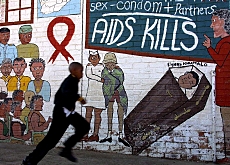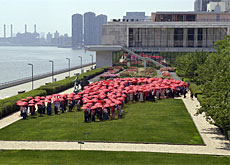Aids community takes stock of progress

The head of the Swiss delegation at the Toronto International Aids Conference, Elisabeth Guggenbühl, tells swissinfo why this year's gathering has been a success.
As the mammoth six-day biennial Aids meeting drew to a close on Friday, experts called for improved prevention measures and greater political leadership in the global fight against HIV/Aids.
“We have the scientific knowledge to be able to save millions of people. We now need the political will to do it,” said Peter Piot, head of the United Nations Aids programme.
Another important issue was money. During the meeting, many of the 24,000 participants complained that rich countries had not been fulfilling their funding promises. UNAids estimates that $18.1 billion (SFr22.3 billion) will be needed in 2007 to fight the disease but only SFr10 billion has been promised.
swissinfo: How successful was this year’s conference?
Elisabeth Guggenbühl: For the Federal Health Office it’s always a success when you have the opportunity to exchange knowledge and experiences with so many different people working in the field of HIV/Aids from around the world. And there is also the fact that HIV/Aids is so firmly in the public eye every two years.
For us it was definitely a success as we were able to gather plenty of new ideas for our work and also to get confirmation that our HIV/Aids strategy seems to be on the right track.
swissinfo: What specific feedback did you receive about Switzerland’s HIV/Aids work?
E.G.: People were really excited about our latest public campaign, “Love Life – Stop Aids”, which seems to be well known and really appreciated. We were really surprised how well known it was worldwide.
There was also considerable interest about our new voluntary counselling and testing programme that we are planning to implement next year. And we received useful input and information for our other prevention campaigns.
swissinfo: One major concern for Switzerland is the rate of new infections – 34 per cent in 2005 – among gay and bisexual men. Did you receive any useful insights into how to tackle this problem?
E.G.: This was rather disappointing as we were hoping to get some ideas how other western countries are dealing with the problem, but unfortunately there was nothing new.
It is obvious that other countries are facing similar problems and are struggling to find new solutions. This conference was not the place for breakthroughs in this area and we therefore need to increase our bilateral exchanges with other countries.
swissinfo: Where do we stand globally in the fight against HIV/Aids?
E.G.: The figures are well known: around 38 million people are infected with HIV, 65% of them living in sub-Saharan Africa, and every year we have four million new infections.
At the conference, it was clearly stated that there has never been so much money available globally to fight HIV/Aids as today. But the problem is that the financial needs have never been so great. Despite certain successes, the figures are growing and an increasing number of people need therapy, which is costly.
Another important message we heard this week is that the human rights situation in certain countries, where homosexuality and prostitution is illegal and people suffering from HIV/Aids are stigmatised, is often so bad that prevention work for these groups is almost impossible.
In India, for example, where homosexuality is forbidden, it is really difficult to do anything under these circumstances.
swissinfo: What do you think about the slogan of this year’s conference “Time to Deliver”? Do we need to make progress in terms of getting medicines to all those who need them.
E.G.: From an international perspective I think this was the right message because we now have considerable knowledge in the fight against HIV/Aids to treat people and do good prevention work.
The challenge is now to really implement our strategies and use this knowledge, and to make governments accountable for HIV/Aids programmes.
swissinfo-interview: Simon Bradley
The 16th International Aids Conference, the biennial gathering of the global Aids community, took place from August 13-18 at the Metro Convention Centre in Toronto, Canada.
Over 24,000 delegates attended from 170 countries, including people living with HIV/Aids, researchers, health workers, activists, politicians, philanthropists and celebrities.
There are more than 38 million people living with HIV. 2.8 million people with HIV/Aids died in 2005, most of them in sub-Saharan Africa where food supplies are scarce and health systems are weak.
65 million people worldwide have contracted Aids since June 1981 and 25 million have died from the disease.
UNAids estimates that about $8.3 billion was spent last year in the treatment, prevention and care of orphans in developing countries, meeting a $7 billion to $10 billion target set five years ago.
According to the Swiss Aids Federation, more than 20,000 men and women live with HIV/Aids in Switzerland. Two people are diagnosed HIV-positive every day.

In compliance with the JTI standards
More: SWI swissinfo.ch certified by the Journalism Trust Initiative




You can find an overview of ongoing debates with our journalists here. Please join us!
If you want to start a conversation about a topic raised in this article or want to report factual errors, email us at english@swissinfo.ch.